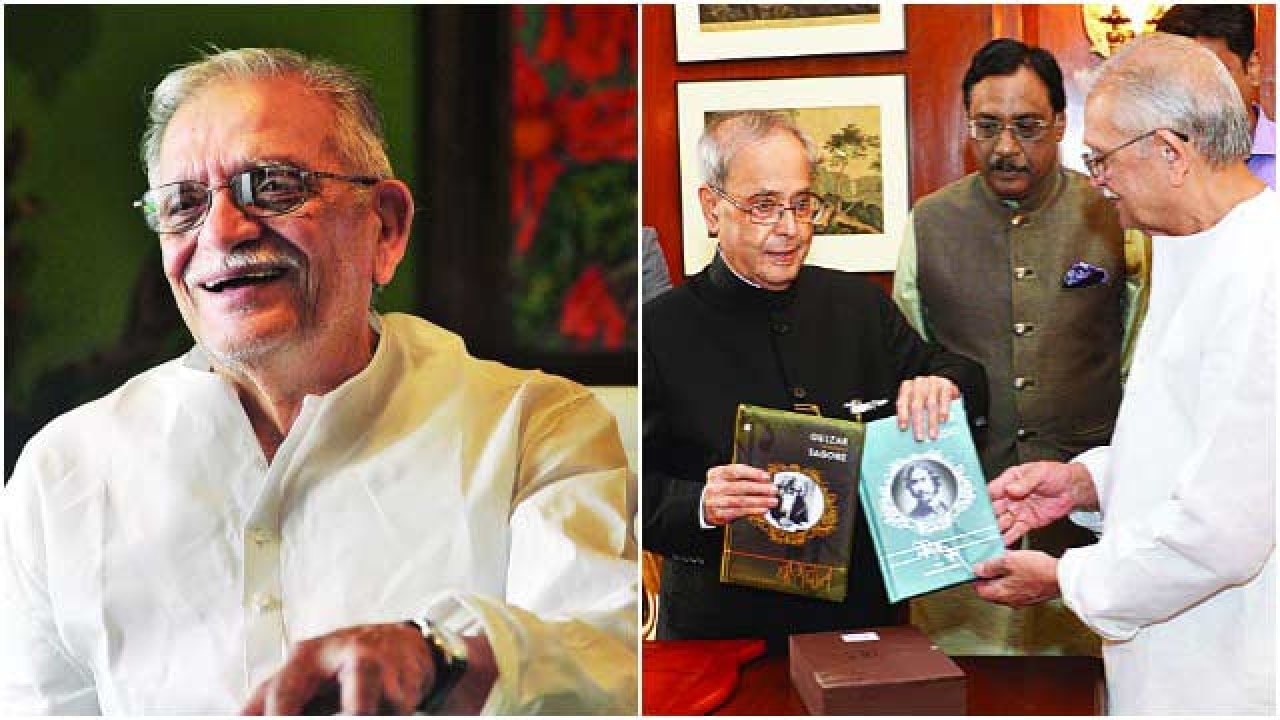
When my family migrated from Punjab during the Partition, we came to Delhi and I was enrolled in United Mission School. Gurudev and his works have been my fascination right from then. And this was from Urdu translations of his work. Then I got hooked on to Saratchandra, Bankim Chandra and Munshi Premchand. It was only later that I began to like Ghalib. For all this I have my Urdu teacher, Maulvi Mujibur Rehman to thank. It is because of him that I got to know the works of all these poets.
You can say that. I have translated Bengali poets such as Subhash Mukhopadhyay and Sunil Gangopadhyay before. These were published by Hindi and Urdu magazines. But to take on Tagore's work is no easy task. I chose Baghban and Shishu Kobita because they were favourites.
I want young children to savour and enjoy Tagore like I did since I was a child. He was too great a poet of India to be kept limited to Bengal. Everybody should read and celebrate him.
I fail to understand why. Gitanjali is not Tagore's best work. It's definitely not Mount Everest in his body of work, just one of the many peaks. I can see where he was coming from. He wrote it aboard a ship to England. You must remember, through his interactions with European visitors to Santiniketan and his interaction with WB Yeats that he knew that foreigners would get the spirituality part of India.
Yes. Also remember, there is no book in Bengali called Gitanjali. He just picked and chose what he thought worked for the Western audience from his various works and put it all together.
Well, the Nobel prize along with Gitanjali was also a recognition of his entire body of work and contribution. Unfortunately, many just read Gitanjali and think they know Tagore. Nothing could be further from the truth. He is much, much more.
Nothing about Tagore is easy. It's not only about meaning, but also the feel. Also, I have translated all the poems in meter, just as he did.
Most translators in other languages useTagore's own English translations to work with. Why did you choose the original Bengali works?
Most non-Bengalis know Tagore through his English translations. All those who translated Tagore into Tamil, Kannada, Marathi or other regional Indian languages have taken from English since most non-Bengalis couldn't read the original Bengali work. I felt a need for somebody to visit those poems in their original nuance and translate.
Tagore's own translations are just not good. He would hack his own work, often to less than half. The original Bangla poem runs into four pages, while the English translation is just one page. He was thinking of the Western reader and often changed the imagery completely if he felt it wasn't working for their socio-cultural context. This created a new poem, misleading those who were translating.
I am thankful to Shantanu Choudhury and Anant Padmanabhan of Harper Collins for having the courage to come out with these two trilingual books.
Using Roman to write Hindi, Bangla or any Indian language never made sense to me.
No. This is a translation. Once you translate, you are bound by the line in front of you; you can't write what you feel. If there are 36 lines in Tagore's poem, I have 36 in the translation. You can match it line by line. The original ras (essence) is intact. That's why it took nearly five years.
I'd have to agree. They should have allowed Gurudev to flourish across India and the world. Translators stayed away because no one wanted to get their work approved by someone else. I understand their concerns on keeping the poetry, writing, Rabindra Sangeet and paintings pure and true, but in the process, they limited him to Bengal. Visva-Bharati became a handicap for Tagore himself.
Bengali came into my life long before the Bangalan (Rakhee) (laughs).
You have to understand the culture, context and milieu of a language to translate. My mother tongue is Punjabi and I know and understand Bulle Shah. So when I write Chaiyyan Chaiyyan, I know what I'm doing. It took 50 years of living in Maharashtra to understand its cultural ethos. That's how I translated Kusumagraj (VV Shirwadkar), Vinda Karandikar, Dilip Chitre or Shripad Krishna Kolhatkar.
Beer Purush from Shishu Kobita and Otithi from Baghban.
Yes, that was the pehli chori. But we come from a land where we celebrate maakhan chori by one of our most beloved gods. Stealing shayari books is equal or better than that. I was asked to take care of our topi-thaili shop where I'd sleep as a child.
I'd read a lot of crime pulp, which I borrowed from a books and newspaper vendor who operated off a bench. Would this man, a refugee of Partition, know what he was doing when he handed me Gurudev's book? A book that would change my entire life? I often wonder.
As for other books, I pinched several poetry books of Iqbal and Josh Malihabadi from my elder brother. I'd mug up entire passages for antakshari in school. Recently, I showed some of them to him and he recognised them. "Now after so many years I know where my books disappeared," he said (laughs).